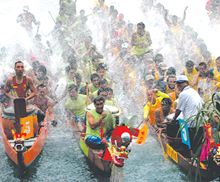
Saturday's Dragon Boat Festival will be celebrated across the country, but, while boat races and the sticky rice dumplings known as zongzi may be growing in popularity, it seems the roots of the festival are being forgotten.
For more than 2,000 years, the festival, which falls on the fifth day of the fifth month of the Chinese lunar calendar, has been marked with the eating of zongzi (glutinous rice wrapped in bamboo or reed leaves to form a pyramid shape) and the racing of dragon boats. That it is all done in remembrance of Qu Yuan, a patriotic poet who committed suicide in 221 BC, seems to be slipping from people's minds.
For 11-year-old Li Xiaoning, a Beijing schoolgirl, the reason we eat zongzi during the Dragon Boat Festival and the origin of the festival do not matter.
"I don't know why we eat zongzi during the festival, but I like zongzi. They are delicious," Li said.
Huang Xiaodi, a software company employee, is just too busy to remember the festival. "I forget the festival almost every year until my friends or colleagues remind me," Huang said.
"But I still think the festival is one of the best occasions for family and friends to get together. And of course, zongzi are a food we cannot skip."
For people in southern China, having zongzi is not so special to the festival. They eat them as frequently as their compatriots from the north have jiaozi, or dumplings.
But now the zongzi on their tables are more complex than usual.
They used to be filled with just rice. But today the dumplings are often filled with meat, minced beans or Chinese dates, and during the Dragon Boat Festival they have many luxuriant fillings such as ham, beef, chestnuts, shellfish and even lobster.
Gong Qihua, a retired 62-year-old from Shanghai, said she lined up for an hour to get special zongzi at the House of Apricot Blossoms, a local food producer established in 1851.
At the store various mini-zongzi, only about 3 centimetres long, are selling well alongside the traditional rice dumplings, which are about five times the size.
However, Shanghai's food health administration warned on Friday that more than 30 percent of the thousands of zongzi it sampled from supermarkets and food stores in the past week have failed to meet hygiene standards.
Besides zongzi, salted eggs and mung bean pastry are also eaten during the festival.
The Dragon Boat Festival is one of the three major traditional Chinese festivals, in addition to the Spring Festival and the Mid-Autumn Festival.
"Traditional festivals have witnessed changing and reshaping in history. It is an unavoidable trend," said Weng Naijun, an archaeologist with the Chinese Academy of Social Sciences.
Some folklore experts believe the Dragon Boat Festival originated from an ancient agricultural religious ceremony. There was a great deal of rainfall in the fifth month of the lunar calendar, which ruined crop seedlings. So farmers cast rice and wine into rivers to worship the God of Rivers so he would bring them a good harvest.
However, the origins of today's festival are more often connected to Qu Yuan, an honest minister and a renowned poet of the State of Chu. On the fifth day of the fifth lunar month, he drowned himself in the Miluo River in what is now central China's Hunan Province after being removed from office.
The local folk did what they could to search for him and dropped dumplings of glutinous rice into the river to prevent fish from eating Qu's body.
As the festival is waning in China, celebrations in South Korea are booming since the festival was introduced there 1,000 years ago.
South Korea has planned to apply to the United Nations Educational, Scientific and Cultural Organization (UNESCO) to list its version of the Dragon Boat Festival as an intangible cultural property.
For all the pride the Chinese take in such traditions, however, they do not necessarily hold any proprietary rights over them.
"Unlike intellectual property rights, which are fixed and unique, the masterpieces of the oral and intangible heritage of humanity can be shared," said archaeologist Weng. "If UNESCO approves something as the intangible cultural property of one country, other countries may still apply for their own versions."
(China Daily June 11, 2005)
|

